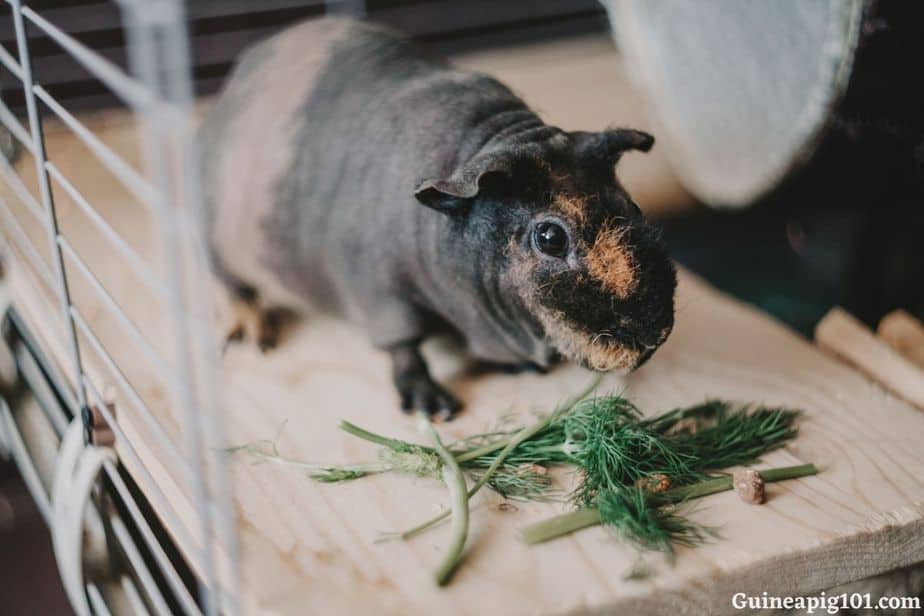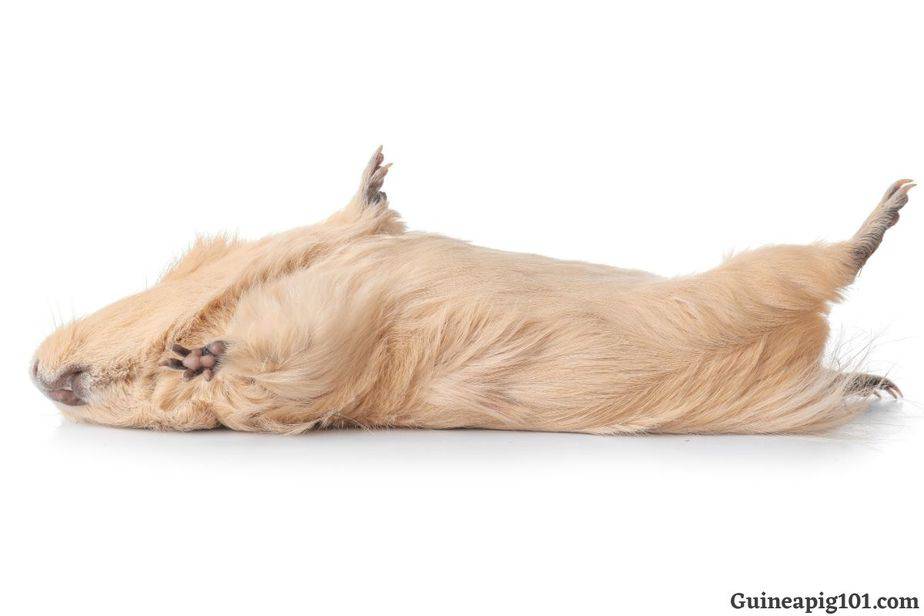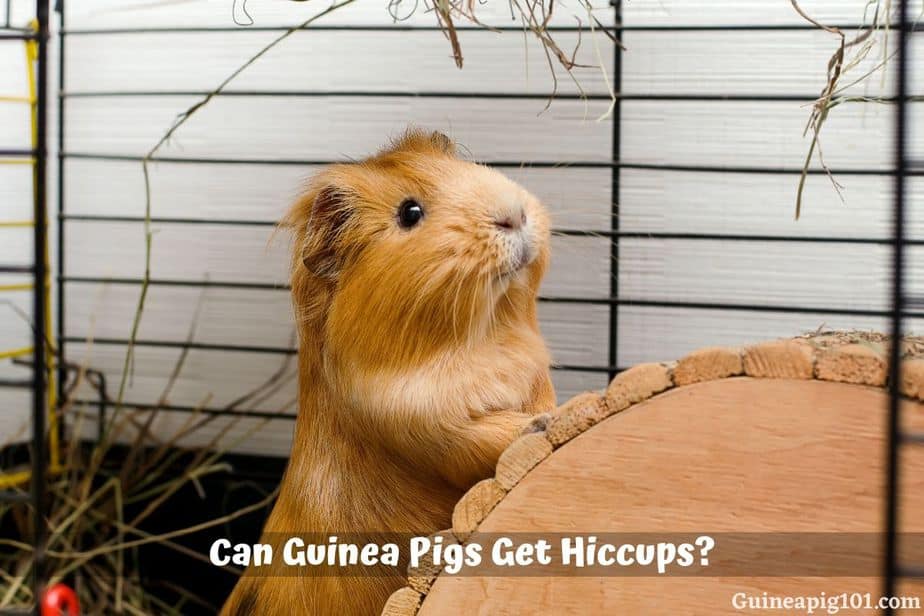When your guinea pigs eat food, they make noises after it, which you may have heard. They move their head up and down and make some different noises. Does that indicate they can experience hiccups? Can guinea pigs get hiccups? Let’s learn all about it.
Sudden contraction of diaphragm muscles causes hiccups in guinea pigs. These contractions happen when they eat fast. If guinea pigs eat more than their capacity to digest, they will consume air, and their diaphragm muscles will get disturbed. They cannot vomit, so they exhale the air in the form of hiccups.
A short period of hiccups creates no problem. It will disappear in a few minutes. But do check your pet’s health if the hiccups continue.
It’s uncommon, but hiccups can be connected to respiratory or gastrointestinal disorders. This lead will help you to know about hiccups and alerting signals.
So, let’s learn more about certain problems that can result in hiccups.
Do guinea pigs get hiccups
Guinea pigs can get hiccups, but you may or may not be able to hear the sound at times.
The sound of their hiccups are somewhat similar to humans, but they are low in level.
If your guinea pigs are hiccuping quietly, they will move their head up and down.
Guinea pigs hiccup too fast, so that may be stressful.
If you have never watched guinea pigs hiccuping, then you may think that they are suffering from sudden illness or some sort of stroke.
If hiccups finish in a few minutes, then it is okay. But if they continue or your guinea pigs act weird, then you must check on them.
Why do guinea pigs get hiccups?

A hiccup is the result of shrinking diaphragm muscles, each time your guinea pig’s body comes in contact with these contractions, their vocal cords will close, which makes the “Hic” sound.
Hiccups in guinea pigs are usually connected with food. If you find your guinea pigs hiccuping, then it means they ate too fast.
And if your guinea pigs eat food quickly, then they will surely take in the air, which then will disturb the diaphragm.
That can be observed in baby guinea pigs or new guinea pigs because they don’t feel secure about the food.
Baby guinea pigs and new guinea pigs didn’t have time to make a good relation with you; they will eat fast in fear of losing food.
More to this, baby guinea pigs like to eat pellets and small food items rather than dry grass or fresh vegetables.
Small food items are more accessible to consume than other options. Your guinea pigs will hardly stop chewing the food.
Don’t worry, your guinea pigs will start believing you soon. They will learn that you give food to them, and do not separate it. That proves that your piggies will eat in a slower pace.
If you observe that your guinea pig is slowly eating food, check what food you are providing them.
Some foods disturb the diaphragm muscles even if your pets are enjoying eating. Like if you offer them vegetables with stalks and they start hiccuping, then it is good to avoid such vegetables.
Playing and exercising can also give your guinea pigs hiccups because if your guinea pigs are high in spirits while being outside, they will surely swallow air. As told, it leads to hiccups.
How long do guinea pig hiccups last
Hiccups should not be regular; they must be temporary issues for guinea pigs.
The diaphragm muscles will relax, and then their hiccups will automatically stop. That usually takes a few minutes to finish; it will also end up early if your guinea pigs are always sitting.
If the hiccups do not stop for a very long time, then you must find out what is wrong with your guinea pigs. Your guinea pigs must be suffering from necessary health matters, which is increasing this problem.
You should figure out other reasons or behaviors which may lead to hiccups. Check if your guinea pigs are showing any of these signs, if yes then they need help:
- Refusing or unable to eat or drink
- Unable to remove or discharge waste
- Signals of physical pain. Like, grinding teeth or laying on back.
These are the signals that show your guinea pigs are suffering from digestive problems.
Hiccups are also the symptoms of this problem, but it is not much to worry about. You can visit a vet if you are unsure about the signs.
How to stop guinea pig hiccups

Never try to hold your guinea pigs’ nose to make them keep their breath; they will get scared and will never trust you again.
Scaring guinea pigs is not a good idea. They are already afraid of you because of your size. Intentionally making your guinea pigs jump or move will not help them stop hiccups. Instead, it could harm them.
The best treatment to stop your guinea pigs hiccuping is time. Your guinea pigs will mostly stay hiccuping by themselves.
You need not worry about it until the problem remains for a more extended period and continues. However, you can help your guinea pigs with some tricks.
Softly, place two fingers on the diaphragm of your guinea pigs. You will find it below the heart and lungs and above the liver.
When you realize where the diaphragm is, gently push it from the tips of your fingers.
However, Guinea pigs get irritated when they are touched on their below side, and hurting them will make it even worse. So, be very careful and gentle to begin with.
If your guinea pigs have a short case of hiccups, then they will remove the air inside easily. Also, they should not stop hiccuping immediately.
If your guinea pigs have a hard or puffy diaphragm, they are surely suffering from health problems.
Are hiccups dangerous for guinea pigs?
Hiccups in guinea pigs are not harmful until they get severe. That might not sound helpful but allow me to explain in detail.
Imagine your child having hiccups. If they have just eaten their food and start to hiccup, you will think nothing about it. They may have gobbled food, or they were very playful after eating.
If somebody hiccups continuously for a couple of hours, then the issue becomes stressful. And if it continues for the entire day, then it is the doctor’s call. The same applies to guinea pigs.
One more thing to note about guinea pigs is that they can not clear their stomach as humans do.
Guinea pigs are not capable of taking out gas noisily from the stomach through mouth or vomit. That means that a digestive problem must get over directly.
It is not that digestion problems of guinea pigs raise tension. Sometimes, guinea pigs hiccups because they suffer from fundamental respiratory issues.
Put a question to yourself that if your guinea pigs are getting hiccups, they might be shaking. That could be caused by low body temperature, they are stressed maybe, or it could be a stroke/sudden illness.
Note the temperature of your guinea pigs, and if it lies between 101-103 degrees Fahrenheit, this much body heat is not to worry about.
Also, find out the cause of why your guinea pigs are stressed. If possible, take them back to their cage to calm down.
If your guinea pigs continue hiccuping without any acceptable reason, your pet’s health is in danger. That is the time to get involved in preventing this problem. Reach out to an experienced vet immediately.
Also read: Why guinea pigs can’t vomit? What to do if something gets stuck in their throat?
Respiratory conditions related to hiccups in guinea pig
Respiratory problems are common in guinea pigs, and this is called snuffles. By which guinea pigs make noises.
Hiccups appear when ill guinea pigs fill their lungs with air, trying to breathe easier. This air also gets filled in their stomach, causing contractions in the diaphragm, which leads to hiccups.
Some guinea pigs will succeed in dealing with respiratory infections on their own. A healthy adult guinea pig has enough immunity to overcome these infections. Features of respiratory infections in guinea pigs are:
- Releasing waste from eyes or nose: You must clean it before your guinea pigs rub this on their body.
- Sneezing, and discharge of white waste: Dry sneezes are easily linked with allergic reactions. Here’s a lead to know about sneezing in guinea pigs and what it means.
- Bending head and scratching ears: This shows that the infection is expanding to ears.
- Laziness and not wishing to be held: One or two days can be accepted for this, but if it continues, then it is a matter of concern.
- Unwillingness to eat: Under the weather, guinea pigs lose their hunger. Like all other small animals, they must eat food within 24 hours.
If your guinea pigs breathe slowly through their mouth, you should surely take them to a vet. Otherwise, they will not start hiccuping. They will also be unable to get enough air from their nose to breathe.
Or you can observe your guinea pigs for a few hours, if they appear living normally like before, they are successful in fighting the infection. Once they get well, hiccups will be over.
Digestive conditions related to hiccups in guinea pig
Digestive problems in guinea pigs are not to be ignored. If your guinea pigs have a stoppage in their digestive path, it immediately becomes damaging. These blockages can cause continuous hiccuping sometimes.
The gastrointestinal stoppage is the most common case which affects the digestion in guinea pigs. The house of guinea pigs calls this ‘the silent killer’ which explains everything to you.
We have advised you to prevent hiccups of your guinea pigs by touching their diaphragm. While doing it, know how it feels. If the belly of your guinea pigs is hard, or they cry when you touch them, call a vet right there.
The hardness and hiccuping in guinea pigs means that they have a blockage in their intestine. That is stopping them from eating and removing waste. Their stomach may make a bubbling sound at this time.
Also read: Constipation in guinea pigs
Hiccups or seizures in guinea pigs

It happens when hiccups of guinea pigs are mistaken for seizures. One of these conditions is a lot more concerning than the other.
If your guinea pigs are hiccuping, they will move their head back and in front. This action will be rapid, and you can miss it if you blink your eyes.
A seizure is different because your guinea pig’s body will start shaking. Your pets may roll their eyes back in their head. They may paddle their legs, spit saliva out of their mouth, and scream.
You will be shocked after watching your pets shaking so much during seizures, too. If you observe, they are getting seizures clear all space.
The other difference between seizures and hiccups is the time they take. Hiccups continue but remain short in speed. They last for a few seconds and then disappear. Though, they can repeat for seconds, minutes, and hours.
Seizures are different. Guinea pigs get seizures less than a minute, even they get over in less than 20 seconds. Convulsions in guinea pigs are scary; anybody who has watched them can not mistake them as hiccups.
If your guinea pigs are experiencing seizures, find out why. They may be stressed or suffering from fundamental medical issues. Not like hiccups, seizures are risky for life.
Also read: Why is my guinea pig stressed and how to get rid of it?
My guinea pig has recurrent hiccups
Some guinea pigs carry an excellent list of health, but experience repeated sets of hiccups. That can lead your guinea pigs annoyed.
In such a situation, you need to make a few changes in their lifestyle. Specially, you need to study their diet and mental health.
Let’s see ahead on what we can do to stop hiccups repeating every time.
Guinea pig hiccups caused by diet
Diet is an essential part of the health of guinea pigs. Guinea pigs do not hiccup because of allergy, but they are sensitive to some particular food. You can know about these foods from the process of removal.
Also read: Bad food for guinea pigs
If your guinea pigs are adults, start from removing pellets from their diet. Except if your guinea pigs have health conditions that need small food balls, such as arthritis, they are unnecessary. Adult guinea pigs can live happily by eating dry grass or hay.
Dry grass/hay, by its nature, takes longer to eat. Your guinea pigs like eating at a relaxed speed if they are chewing hay. It reduces the chances of swallowing air.
Another thing, look at vegetables that you are providing them. Salad is recommended as ‘guinea pig’ food, but some varieties do not suit guinea pigs.
For example, Iceberg lettuce contains a fluid called lactucarium, which irritates the stomach of guinea pigs.
Ask yourself if you are feeding a lot to your pets. A guinea pig whose stomach is full but causing discomfort will get hiccups.
Unlimited dry grass if fine. Fresh vegetables must be limited to a cup daily.
Guinea pig hiccups caused by mental health
You must be sure that your guinea pigs must not be stressed. Hiccups are not a direct result of stress. However, feelings of insecurity can change behavior that causes hiccups.
We have talked about how baby guinea pigs feel insecure about their food. Most guinea pigs grow like this, but only when they are given reason to do so. Guinea pigs require security and routine in their lives.
If you are irregular with the routine of your guinea pigs, they will get confused. They will doubt when their next meal will come.
They will feel happy when they will get their food according to the imaginative watch they have set.
The right time to feed your guinea pigs is morning and before bedtime. They will inevitably rise hungry and enjoy this as a timetable.
If you teach your pets that early morning is eating time, they will relax quickly.
It might happen that you are not the problem, but the other guinea pig who is sharing the cage makes your one guinea pig feel insecure.
Two guineas together will establish the alpha and beta positions. Once this issue gets settled, then both guinea pigs will get satisfied.
Until then, they both will be careful of each other. Anyone of them may eat their food before the other arrives.
Also learn: All about guinea pig dominance and what you can do?
That is one of the causes, which is why two guinea pigs must not live together in one cage until they have a good bond.
Once they do this, they become partners for life. But before this, they will be each other’s competitors.
All guinea pigs will likely experience hiccups at a certain age. It is more observed in baby guinea pigs than in adult guinea pigs, but every guinea pig has to experience this sometime in their life.
Sources: Respiratory infections, Viral Pneumonia in Guinea Pigs, Diet Composition of Guinea Pigs, Respiratory Bacterial Disease in Guinea Pigs, Mechanics of Respiration in Unanesthetized Guinea Pigs.
